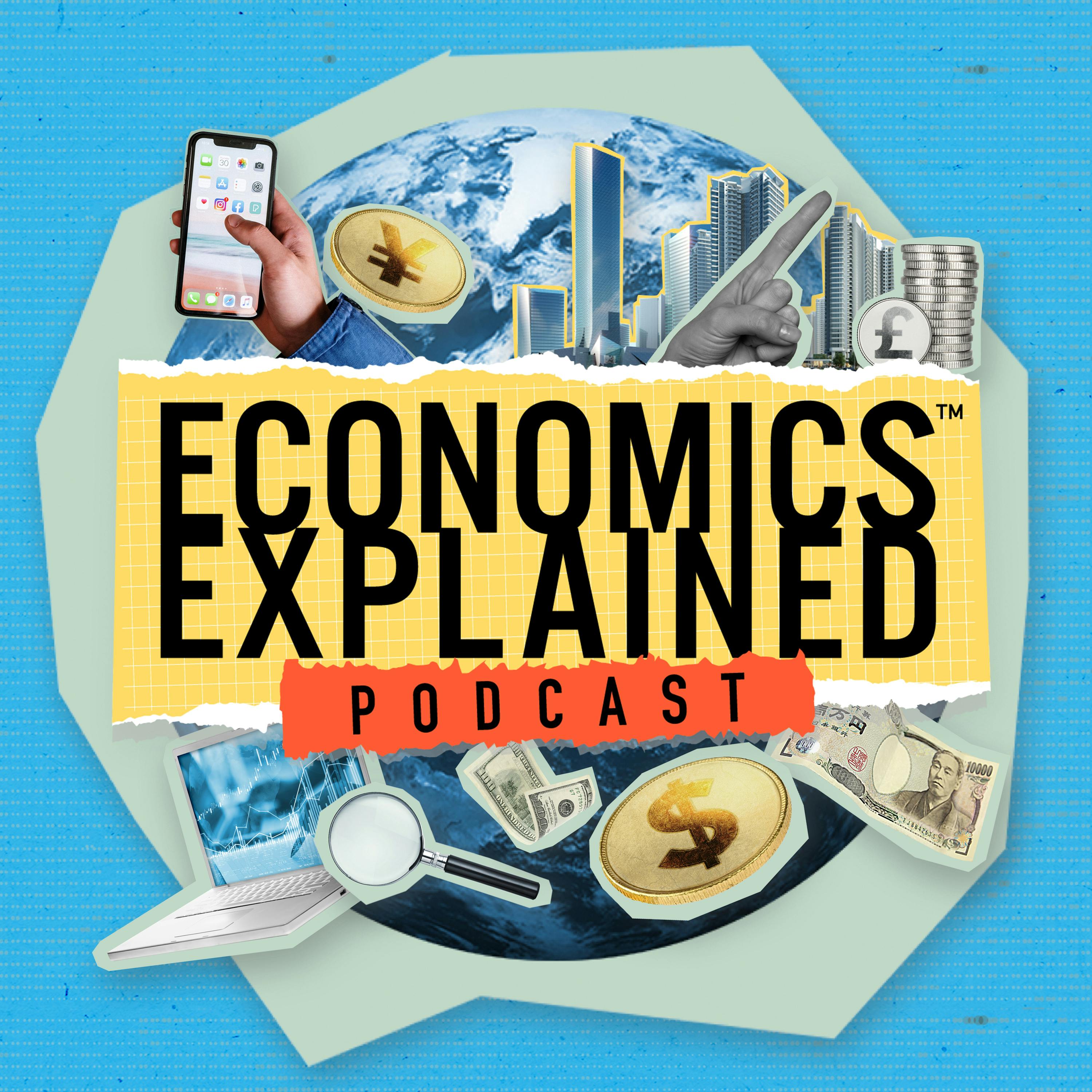

Economics Explained
Economics Explained
On Economics Explained, we take a look at interesting countries, policies, and decisions from the point of view of an economist. The world is an interesting place and we hope to uncover some of this intrigue in our short, informative podcasts.
Episodes
Mentioned books

11 snips
Dec 22, 2025 • 16min
Did China Just Drop The Ball On Global Dominance?
China's waning growth and rising wages are reshaping its role as the world's factory. As a shrinking workforce and a property crisis weigh heavily, alternative manufacturing hubs like India emerge with strong growth forecasts and production incentives attracting major companies. Automation and AI are altering priorities, making stability a new goal over just cheap labor. Meanwhile, geographic competition heats up with Vietnam, Mexico, and Indonesia vying for investment. The discussion raises critical questions about whether India can leverage its advantages to redefine manufacturing and avoid pitfalls like inequality.

9 snips
Dec 2, 2025 • 13min
A Short Story About Why You Cannot Buy A House
Home ownership is increasingly out of reach in major cities, with housing prices reaching astronomical multiples of average income. Essential workers are being pushed out, raising urgent questions about housing as an investment rather than a necessity. Factors like zoning regulations, low interest rates, and pandemic disruptions have exacerbated the crisis. Existing subsidies are failing to help, inflating demand without addressing supply. The discussion includes potential global policy solutions to tackle this pressing issue.

Nov 17, 2025 • 17min
The $400 Trillion Problem No One Wants to Talk About
The global pension crisis is reaching a tipping point as the worker-to-retiree ratio plummets. With projections showing a $400 trillion retirement gap by 2050, countries are grappling with potential insolvencies. Examples from Japan and France highlight unique demographic challenges. Solutions like Denmark's retirement age tied to life expectancy and Sweden's automatic adjustments are discussed. The podcast delves into why many politicians shy away from necessary reforms, raising the stakes for future generations.

13 snips
Nov 12, 2025 • 19min
The 2025 Nobel Prize in Economics: Explained
Dive into the revolutionary ideas recognized by this year's Nobel Prize winners in economics. Discover how technological innovation spurred unprecedented wealth since the Industrial Revolution. Explore why understanding and creativity are vital for continuous growth. Delve into the impact of AI on jobs and the balance of intellectual property and competition. Uncover the challenges ahead as society navigates the evolving landscape of innovation and economic progress.

24 snips
Oct 11, 2025 • 14min
Why Everyone is leaving New Zealand
Explore the surprising trend of young talent leaving New Zealand despite its beauty and quality of life. Discover how the country's remote location limits its economy and fosters a strong agriculture sector. Dive into the consequences of skyrocketing housing costs and the allure of better job prospects in Australia. Learn about the cultural and legal ties that facilitate this migration and the political hurdles in reversing the brain drain. Can this enchanting destination attract its youth back home?

Sep 30, 2025 • 16min
Stagflation
Stagflation is making a comeback, creating a perfect storm of rising unemployment, slow growth, and stubborn inflation. The dangers of this economic combo are discussed, along with the failing objectives of the Fed. Experts dive into how the USD's reserve status might not shield it from problems. There's a critical look at whether official job statistics are telling the whole story, and the impact of current policies on economic stability is explored. If this crisis intensifies, the ripple effects could be felt worldwide!

21 snips
Sep 5, 2025 • 15min
What Happens When Capitalism Doesn't Need Workers Anymore?
Imagine a future where AI outperforms humans at work—it's happening now! Explore how automation increases GDP in wealthy nations while jeopardizing jobs in developing economies. Discover the outsourcing shifts from the US to countries like the Philippines and Bangladesh, and the widening economic disparity it creates. The podcast tackles the dual impact of AI on employment, highlighting the need for skills enhancement and digital inclusion to navigate this technological upheaval. Can societies adapt, or will they be left behind?

Aug 27, 2025 • 18min
Is the survival of humanity economically viable?
Discover how energy fuels economies and why global warming poses dire economic risks. The discussion dives into the shale boom's massive financial impact and Iceland's geothermal benefits. With energy prices soaring, can we achieve both economic growth and climate goals? Explore the need for global cooperation to address climate costs and the balancing act required for renewable energy and nuclear power. The conversation also highlights the political challenges of nuclear energy and the potential of carbon pricing in promoting decarbonization.

62 snips
Aug 11, 2025 • 16min
Why do We Still Need to Work?
The podcast explores the stark contrast between Keynes' dream of a 15-hour workweek and today's reality of longer hours. It delves into the rise of 'bullshit jobs' and how technology has not reduced work time as expected. The concept of 'ghost working' reveals a culture of busy work that often lacks true productivity. Proposals for a four-day workweek are examined, highlighting international examples and potential challenges. Ultimately, the conversation emphasizes the need for reform to enhance job satisfaction and efficiency.

12 snips
Aug 5, 2025 • 19min
Do We Still Need Central Banks?
Central banks play a crucial role in economic stability, inflation management, and employment rates. The historical evolution of the Federal Reserve reveals its impact, especially during crises like the 1907 financial collapse. Current debates highlight concerns about rising debt and inequality, questioning the Fed's future. The intricacies of monetary policy and quantitative easing show how central banks navigate complex challenges. If the Fed were to disappear, the potential chaos could rock the global economy, raising urgent questions about financial stability.


